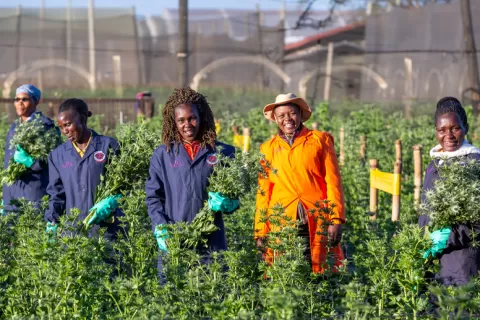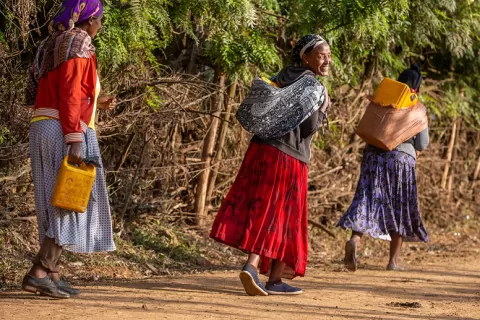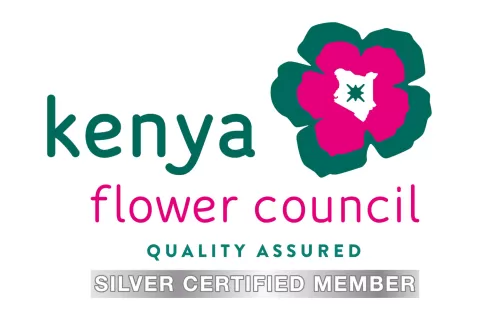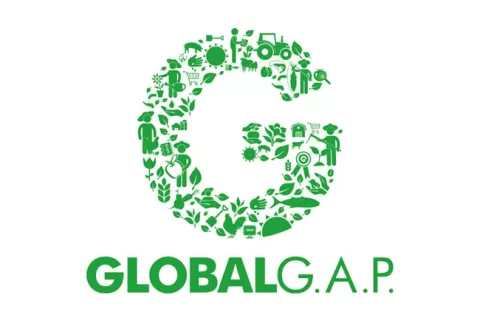Sustainability at Marginpar: an ESG approach
Sustainability is a continuous journey—one we are proud to embark on. It requires dedication, innovation, and responsibility. At Marginpar, we take a holistic approach to long-term sustainability, aligning with Environmental, Social, and Governance (ESG) principles to ensure a positive impact on the planet, our people, and the industry.
We are proud to say that our flower farms are fully certified, and our partner farms are on their way to full certification. Currently, 95% of our flowers are sustainably produced, and we are committed to reaching 100%.

Environment: Protecting the planet
Environmental responsibility is at the heart of our operations. Our focus lies in sustainable agriculture, resource efficiency, and reducing our ecological footprint.
- Soil health & biodiversity: Healthy plants begin with healthy soil. We nurture soil life using compost, worm tea, and biochar. This enriches microbial activity, enhances resilience, and naturally protects against pests and diseases. Unlike synthetic fertilisers, compost improves soil structure and sustainability over time.
- Water conservation: We harvest and store rainfall for efficient water use, while advanced sensors monitor soil moisture to prevent waste. We also have constructed wetlands to be able to recycle and reuse waste water for irrigation.
- Pesticide reduction: We use ‘spot spraying’ and biological pest control methods (like sticky traps, pheromone traps and natural predators) to protect biodiversity and reduce chemical dependency.
- Energy efficiency: We are transitioning to LED lighting and solar power, significantly lowering our carbon footprint.
- Waste management: Our approach is guided by Hamuka, a philosophy inspired by Kaizen, which emphasises continuous improvement and waste minimisation. We focus on the three core principles of waste management - reduce, reuse, and recycle – and apply it to each step of the process.
By implementing these Good Agricultural Practices (GAP), we are not only improving our own operations, but also setting a benchmark for the floral industry.
Social: Empowering people & communities
Sustainability is also about people—our workforce, our local communities, and the well-being of everyone involved.
- Kaizen methodology: Our Japanese-inspired management system fosters employee participation, empowering individuals at all levels to suggest and implement improvements.
- Gender equality: 50% of our positions are held by women, supporting inclusivity and opportunity.
- Health & well-being: Every farm has a medical team, and we provide nutritious daily meals for all workers.
- Access to clean drinking water: Each employee is allowed to take five litres of clean water per day home.
- Community support: We invest in local schools, roads, and infrastructure, helping to create better living conditions beyond our farms.
When we care for people, everything grows. By focusing on social sustainability, we create a workplace where employees feel empowered and communities continue to develop.
Governance: Going beyond compliance
Governance is about having proper policies, certifications and permits in place. All our Kenyan and Ethiopian farms and Tanzanian partner farms are certified. Our partner farms in Zimbabwe are in the process of certification. Below is an overview of our flowers farms and their certifications:
- Kenya: 7 flower farms – KFC* Silver Label
- Ethiopia: 3 flower farms – MPS-ABC** (score A) & MPS-SQ & GlobalG.A.P.***
- Tanzania: 3 partner farms– MPS-ABC (score A), MPS-GAP & MPS-SQ
- Zimbabwe: 4 partner farms – partly MPS certified and partly still in the certification process
Our governance mantra is “going beyond compliance”. We strive to meet international best practice standards in our industry. Read more about our certificates here.
*The KFC Silver certificate is based on environmental and socio-economic principles which ensure certified producers foster sustainable, responsible and safe production of cut flowers and ornamentals. The Standard covers good agricultural practice, human resource management and workers welfare, good governance, health & safety, environmental protection & conservation, and post-harvest management.
**The MPS label is divided into three parts. MPS-ABC for the Environment component (where A+ is the highest attainable); MPS SQ for the social component and MPS GAP for sustainable and safe farming practices.
***GLOBALG.A.P. is a trademark and a set of standards for good agricultural practices (G.A.P.) for safe, sustainable agriculture worldwide. The GLOBALG.A.P. Flowers & Ornamentals Standard.
ESG videos
In our video series 'Ask Marginpar' we answer questions from our customers. Two of which are about sustainability. And we have some great news: we have finished filming season 2, with more questions about sustainability matters! Keep an eye out on our LinkedIn, Instagram or Facebook to see them as soon as they are released!
International best practice
We strive to meet the following international standards and guidelines in our business:
- The Performance Standards of the International Finance Corporation
- The Environment Health and Safety Guidelines of the World Bank
- The International Labour Organisation Labour Standards
- The EIB Environment and Social Standards
- The International Bill of Human Rights












